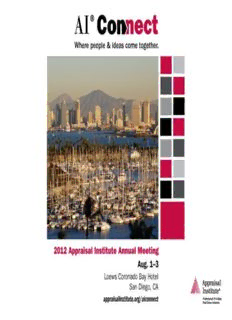
The Dictionary of Real Estate Appraisal PDF
Preview The Dictionary of Real Estate Appraisal
EXPERIMENTAL AND NON-TRADITIONAL VALUATION METHODS: GUIDELINES FOR APPRAISERS Appraisal Institute Annual Meeting San Diego, California | August 2, 2012 Richard J. Roddewig, MAI, CRE, FRICS President, Clarion Associates, Inc. Speaker Qualifications • Richard J. Roddewig, MAI, CRE – President of Clarion Associates – More than 30 years appraisal experience – Works nationally on appraisal assignments in litigation situations – Member of AI Special Task Group for the Development of Standards for Determining the Acceptability of Applications for Statistical and Market Survey Techniques to the Valuation of Real Property – Recipient of 2012 George L. Schmutz award for AI book “Appraising Conservation and Historic Preservation Easements” – Editor of AI book “Valuing Contaminated Properties: An Appraisal Institute Anthology” – Developer of four Appraisal Institute seminars and courses – Author of many articles in Appraisal Journal and other publications 3 4 Topic One: Key Questions • 1. Are licensed appraisers required to use only “recognized” and “generally accepted” methods? • 2. If so, how do we know when a method has become “generally accepted”? 5 Topic One: Key Questions • 3. When is it appropriate for appraisers to use methods and techniques of non- appraisers, such as economists? • 4. When and how do techniques of “economists” and real estate professors rise to the level of becoming “recognized” and “generally accepted”? 6 Topic One: Key Questions • 5. Are meta-analysis, contingent valuation and regression analysis recognized and generally accepted methods of the appraisal profession? 7 Topic One: Key Questions • 6. Are there special issues that arise related to use of recognized & generally accepted methods in appraisal assignments in litigation settings? 8 9 Topic Two • Sources of Information on Recognized and Generally Accepted Appraisal Techniques 10
Description: